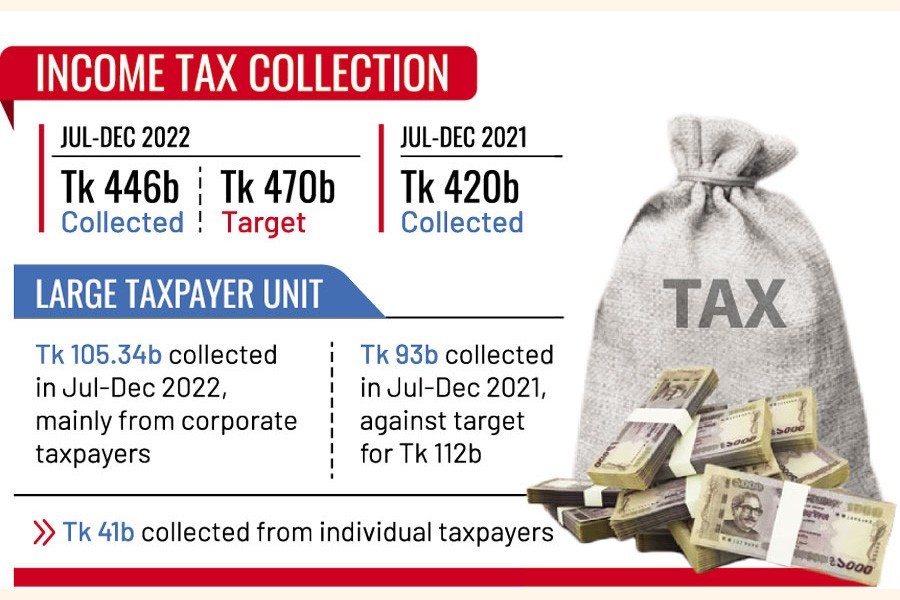Direct tax collection-growth slowed by 7.01 per cent against the target set for the first half of the current fiscal year (FY) for sluggish economic activities in the country.
However, the growth was 6.19 per cent higher than the corresponding period of the FY 2021-22.
Tax officials said net income of both individuals and companies contracted during the last one year with its Domino effect on direct tax-mobilization scenario.
Experts think looming global recession affected government's direct tax collection in the July-December (H1) period.
The National Board of Revenue (NBR) collected Tk 446 billion in income taxes in the H1 against its target at Tk 470 billion.
Last year, the NBR collected Tk 420 billion worth of income tax in the corresponding period.
Tax experts opine that government's austerity measures resulted in the shrinking of import of goods and other revenue-generating activity.
The direct tax-collection growth was below NBR's average revenue-collection growth of 14 per cent.
Officials point out that the Large Taxpayers Unit under income tax department collects a big chunk of revenue from banks and financial institutions every year. Profits and losses of banks at the year-end in December leave significant impact of LTU tax collection.
LTU officials said most banks' operating profits were in a positive trajectory in the last calendar year, 2022.
They, however, expect that tax collection from large taxpayers may not face any major blow if financial health of banks remained sound until end of the current FY.
Until December, the LTU had collected Tk 105.34 billion in tax revenue-- mainly from corporate taxpayers. Last year, the unit collected Tk 93 billion taxes against its target for Tk 112 billion.
The NBR received Tk 41 billion in income taxes from individual taxpayers in the H1 with the tax return. The extended deadline for tax-return submission by individual taxpayers expired on January 1, 2023.
A senior tax official said the income-tax wing collects a major part of its revenue from Advance Income Tax (AIT) collected at source. Gradually, share of source taxes or AIT in the income-tax collection is increasing, he said.
Dr Mohammad Abdur Razzaque, Chairman of the Research and Policy Integration for Development (RAPID) and Research Director of the Policy Research Institute (PRI), says the country's tax net is still narrow with a slow growth of tax-return submission.
"Revenue generation on per return has marked a nominal growth, indicating that marginal group of people have mostly filed tax returns this year," he adds.
He suggests that the NBR should follow up whether its mandatory rule on submission of proof of tax-return submission for obtaining 38 types of services is working properly.
"Direct tax-collection growth remains poor due to our dependence on indirect-tax mobilization," he says to indicate a systemic fault.
Indirect tax would grow naturally while it is difficult to escalate the pace of direct tax collection through building awareness and motivational campaigns, he said.
The NBR will have to focus on the emerging growth centres where many people remain still out of tax net, he added.
Capacity building and recruitment of manpower would be needed to intensify the NBR's effort to expand the direct tax net.
He points that the tendency of tax evasion is relatively high in Bangladesh where only .8 million are registered taxpayers out of 160 million people while 29,000 companies file tax returns out of above 2,00,000 registered companies in the Registrar of Joint Stock Companies and Firms.
He suggests an overhaul of the existing wealth-surcharge provisions as only a few people are paying the taxes for faulty rules of wealth valuation.


